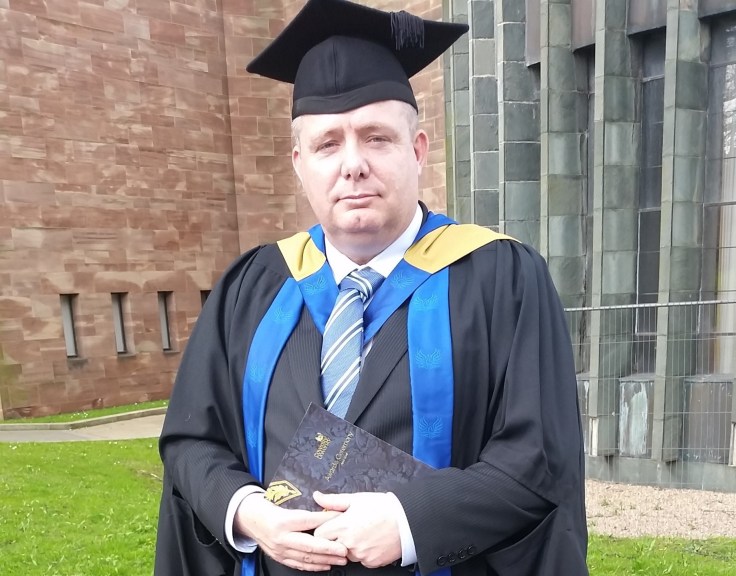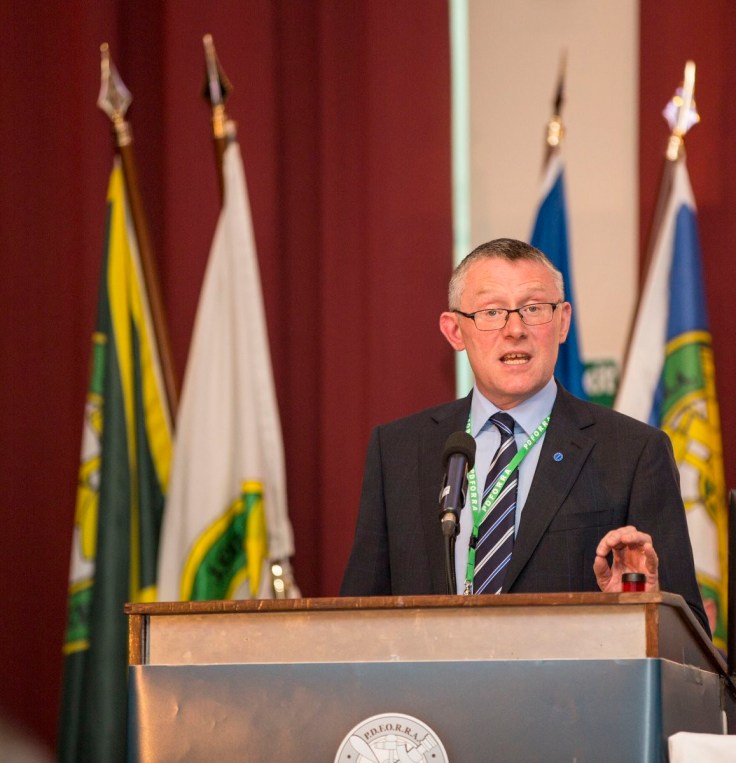Reproduced here with the kind permission of the Editor of An Cosantóir, this is the first article I ever had published and it was featured in the September 2016 edition.
Charting a new course:
The Defence Forces represents a career and a lifestyle like no other. It affords great opportunities with great challenges as well. The military ethos with its traditionally strong bonds of friendship and camaraderie soaks into the fibre of everyone that passes through.
However, like all good things in life it must come to an end at some point.
In this article, I explore how NCOs who have retired from the Defence Forces have found the transition to civilian life. In particular, what impact the training and education they received within the DF has had on their search for employment, what they have experienced and what tips would they give to anyone who is thinking about making the leap.
Educational opportunities & development:
The Defence Forces has been providing vocational training to the enlisted ranks in a wide variety of skills & trades for many years. From the days of the Army Apprentice School up to today where it continues to do so through the apprenticeship system of the Technical Trainee Scheme:
Mr. Viv Collins who retired as a Sgt in 1995 found “The education system, in my time was excellent, provided you wanted to be educated. It gave a lot of chaps the option to further themselves, which was not possible for them to achieve prior to joining up.”
(32nd Platoon, Army Apprentice School, Devoy Barracks)
Building on those past traditions, current Defence Forces training and educational standards are at an all-time high.
With determination and vision, academic accreditation was achieved for the Potential NCOs course which is now awarded a Diploma in Leadership, Management & Naval/Defence studies. This level 6 award represented a major leap forward for the professional development of NCOs throughout the Defence Forces
It affords the opportunity for any serviceman who works through their training pathway to eventually achieve a BA in Leadership, Management & Naval/Defence Studies for the Senior NCOs course set at level 7 on the National Framework of Qualifications.
It is a real and solid qualification that allows an NCO to place his skills in leadership and management at the level that can easily be recognised and understood by potential civilian employers.
It also provides a platform to build on with further study. The NCO may advance through to Honours Degrees, to a Masters and beyond.
Exploration and Exploitation:
Cdr Brian Fitzgerald was one of the driving forces behind the successful achievement of accreditation. He has a passionate belief that the years of service and the experience of NCOs was going unrecognised and unrewarded.

Picture. John Allen
He feels that while what has been achieved is a legitimate reward for the work done, there is still yet plenty more to do and that the way forwards has several strands:
‘The Naval Service has to continue to encourage and enable its personnel to engage with personal development through further education opportunities. The state has to ensure that serving and retired personnel are properly and appropriately recognised in order to optimise their contribution to society. Most especially in the maritime sector”
He emphasises that it is important that the current individuals undergoing training are enabled for ‘exploration and exploitation of further education in order to self-actualise.’ And that every opportunity should be used to ensure ‘retrospective academic recognition for all those who completed the same programme prior to it being accredited.’
Since the introduction of accreditation, the numbers gaining the BA are at about 60%. I ask the Commander what would he say to encourage the potential students.
‘It is in the interest of the individual, the organisation and the country that all personnel seek to have their training and education recognised by the national and international standard. In light of the minimal extra requirement it would be a shame to let such an opportunity pass.’
While all this education and training is very beneficial it to the individual, it is also hugely beneficial to the organisation as a whole. Having highly trained and competent people at all levels of Defence forces is how we will position ourselves to achieve even more, as we advance as an organisation.
Making the Grade:
I spoke to a Mr. Eamon Dolan who has followed this pathway and has just received the award of his Masters in Maritime Security from the University of Coventry.
Eamon retired in 2011 after 25 years’ of service.
A Petty Officer (Writer) with a huge wealth of knowledge and experience built up in running the personnel management unit, Eamon specialised in the roll out of the DF Computerised Administration Package (UCS/PMS).
He also had excellent overseas experience having served 5 tours on various United Nations missions.
He proudly recalls “I was on the first Senior NCO Course to Complete the BA in Leadership, Management & Naval Studies where I achieved a Distinction.”
I asked where all this had lead him?
“I am the Training & Quality Manager with an Irish/Portuguese Based Logistics and Mailing Company,” Eamon writes via email from the Lisbon base of his company. “I am firmly of the opinion that Continuous Improvement & Personal Development (CIPD) is an intrinsic facet of the Current/Post-military life.”
He finds parallels throughout his work with outside companies, from new entrants starting out to the building of effective teams
“The modern Defence Forces demands excellence and instils that demand in each of us. You are expected to excel and set a high individual standard while also integrating into a cohesive unit”
Given that he has achieved so much in his relatively short time as a civilian what are Eamon’s hopes for the future?
“I have been provisionally invited to submit a Paper for and attend on a panel for an International Maritime Security Forum in Izmir in September 2016 which is an excellent opportunity for both personal & professional growth.”
What advice would he give to those planning retirement or a change of occupation?
“For those considering retirement from the Defence Forces, I would offer that preparation and planning are key components of any exit strategy. Envisage where you see yourself and then consider what you need to achieve that. The main thing is to take responsibility and make it happen.”
The Spark of a Salesman:
You can achieve success in any business if you find an area that you have a real passion for. This is the advice from Mr. Andy Mackin who splits his time working between his offices in Ireland and further afield in England, Sweden and the USA.
Andy joined the Defence Forces in 1985 and after 21 Years retired as a Petty Officer Electrical Artificer. With the solid technical background of his trade, he has built on his academic achievements by studying Health & Safety first with University College Cork.
Building his business from the ground up, he has gone on to study Training and Education with NUI Maynooth & Galway.
Andy told me a little about his company.
“I own and run a company called Mackin Consultancy Ltd, we are an Integrated Management Solution (IMS) Company, helping all manner of businesses including multinationals to achieve certification in Quality, Health and Safety (H&S) or Environmental standards as appropriate, in their respective areas of expertise.
I asked Andy what was his education like prior to his departure in 2006?
“Generally, education with in the DF during my time was primarily focused on your career within. Some of it is was not relevant to outside. Having said that, Defence Force Tradespeople are very well trained and are very much sought after.”
What are your hopes for the future?
“Having business in four different countries presents challenges but my hope for the future is to continue to grow my business and see how far the journey takes me. My time in the Naval Service was something that I am extremely proud off and I learned a lot from”
Have you any advice for those nearing retirement or planning a change of occupation?
“Third level education is a very good advantage not always necessary, a lot of the larger companies use the qualification as a filtering process while reviewing applications, even though someone may have fantastic experience it may not always be taken into account”
It can be very challenging:
I spoke to a veteran who is employed in the manufacturing industry who outlined to me some of the advice he would give anyone thinking about departing the service.
“Anyone looking to leave, start looking for a job early, register and use the websites i.e. jobs.ie, jobs indeed etc. Different job search websites suit different skill levels, so look around”
He offers an important tip about CVs and managing one’s expectations to secure employment
“Change your CV to suit the job description. Yes, a high level of training is required but not always academic training. I found looking for a technical job locally where I was based was not going to happen. So my wife and I set down areas we were willing to move to for employment and using the job search websites selected these areas. After 4 months just two choices progressed as far a reply back and only one went all the way to a job offer.”
While there are many employers out there that have knowledge of the Defence Forces and what we do, there are many more who do not.
I spoke to Mr. Martin Gibbons a successful businessman and ex Naval Lieutenant about what he looks in a potential employee.
“I have employed ex-army staff in the past, the attractive aspects of former military staff are their ability for team play and to work within a disciplined structure towards the successful completion of each goal.”
However, he cautions that
“Former military personnel can get a shock when they go into a civilian job as they do not have the many securities that were supporting them in the military. There is an absolute requirement for the success of each project, as an overrun could cripple an SME like mine”
I asked Martin what do you look for in a CV or during an interview?
“I value academic qualifications as they are an indicator of intelligence and discipline but in truth, real-life experience is the better of the two once you have that crucial ingredient “ATTITUDE” he went on to say that he likes to get the sense of “a decent person” which Martin feels is “a very underestimated quality as it combines many good qualities to form a decent person”.
PDFORRA:
Given the huge impact, further education has, PDFORRA are of the view that education not only enables individuals to perform better in the workplace but also helps to improve their overall development, health and wellbeing.
Mr Gerry Rooney, General Secretary PDFORRA is passionate about delivering real improvements for his members, he says that “The accreditation system allows members who progress through the ranks to have their service both recognised and rewarded. This recognises that Defence Force Service has worth both internally and externally.”
I asked would PDFORRA feel that accreditation should be sought for more internal courses?
“PDFORRA are of the belief that as many courses as possible should be delivered to a standard which would achieve accreditation. This may be possible through the Recognition of Prior Learning. PDFORRA would like to see that all training, skills and competencies gained throughout life in the Defence Forces are transferable to civilian applications.”
Education can be very expensive and this is a huge factor with service personnel who having seen wages substantially reduced and their mortgages and other costs of living rise. This narrows the options when it comes to investing in themselves. However, it is often the case that choosing the right course could make all the difference to substantial gains when the time comes to exit the service.
Mr Rooney would like to see the Department of Defence budget for external education increased.
Mr Rooney feels that “All external educational courses should be open to all ranks and a larger budget would also improve access. PDFORRA believes that loyal service in the Defence Forces should be developed and rewarded through access to personal and professional development.”
Slip and Proceed:
In writing this I have been struck at how many retirees still define themselves as Army/Navy/Air Corps, even after having left for many decades. They have had entire new careers outside but still that bond exists, they keep in contact with old comrades and will tell you “war stories” at the drop of a hat.
One retired tradesman’s said after 22 years’ service in Army “The Biggest problem I found on leaving was the lack of comradeship”, he found this after working in Europe for many years. When he looks back at his service “I know that we all complained when we were in service, about many things, but it’s not until you leave that you understand the good points that the DF has and brings to our lives”
People who join the DF for a large variety of reasons and People stay within the DF very often for different reasons than when they joined. People come to a different understanding of themselves within the organisation as peoples own life circumstances change over time. Different pressures effect the older service person that were not envisaged by their younger self.
There are still many older contract personnel who may remain in service until they are 60. Those who have joined since 1994 must be aware that they must leave the service at 50 if they are a Sgt and may only serve until 56 for the ranks higher than that.
PDFORRA are working on this issue but there are no guarantees that they will achieve any increase in mandatory retirement ages.
This means that a PO/Sgt who joined at 18 years old in 1994 will reach mandatory retirement in 2026, will have 18 years of working life until they receive the OAP at age 68 in 2044.
Trying to enter the labour market at age 50 in today’s world is hard but no doubt it will become harder in the future. As who knows what challenges the world of 2026 will present.
These personnel may have to consider would it be best for them to retire prior to the mandatory age and seek a second career in the civilian world in their early 40’s.
So while it is incumbent on the individual to ensure that they are prepared to meet those future challenges, it is also incumbent on the organisation that those who provide loyal service to the state are properly prepared for life after the Defence Forces.
Remember the school motto still rings true, “Ni Obair in Aisce Í”.









Leave a comment